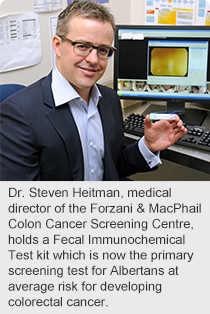
January 23, 2014
Story Dawn Walton; photo by Paul Rotzinger
Alberta has a new colorectal cancer screening test that could save hundreds of lives by detecting the potentially deadly disease earlier.
That’s welcome news to colorectal cancer survivor Jennifer Gardiner, who urges Albertans to ask their family doctor if they should take the test.
“It’s easy to take home, it’s easy to do at home ... and it’s easy and quick to get results,” the Calgary woman says.
 “Please, for the sake of not having to go through what I’ve gone through and what I see other patients up at Tom Baker (Cancer Centre) chemotherapy going through every single day, please do this test…. It just might save your life.”
“Please, for the sake of not having to go through what I’ve gone through and what I see other patients up at Tom Baker (Cancer Centre) chemotherapy going through every single day, please do this test…. It just might save your life.”
Every year, about 1,900 Albertans are diagnosed with colorectal cancer and about 600 die of the disease.
Nearly one million Albertans may be eligible to take the Fecal Immunochemical Test (FIT), a home stool test that is now the primary screening test for average-risk Albertans between the ages of 50 to 74. The simple stool test may also eliminate the need for many average-risk Albertans to have a colonoscopy, freeing up capacity for people who need the procedure more urgently.
“FIT is expected to help optimize screening-related colonoscopy services across Alberta,” says Dr. Clarence Wong, Medical Lead of Alberta Health Services’ Alberta Colorectal Cancer Screening Program.
Alberta Health Services aims to have at least 70 per cent of targeted Albertans up-to-date with colorectal cancer screening within the next five years. Those rates are currently about 40 per cent or lower, especially in rural areas.
“A significant rise in screening rates would have a tremendous impact in Alberta for a cancer that can often be controlled or prevented when you catch it early enough,” says Dr. Paul Grundy, Senior Vice President and Senior Medical Director of CancerControl Alberta.
Colorectal cancer is one of the most commonly diagnosed cancers in Alberta, and is the second most deadly form of the disease behind lung cancer. Approximately one in every 13 men, and one in every 16 women, will develop invasive colorectal cancer in their lifetimes.
Screening programs aim to reduce colorectal cancer incidence rates by 20 per cent and mortality by 30 per cent.
Even at current screening rates, FIT is expected to prevent about 200 cases of cancer per year. This number is expected to increase significantly as screening rates increase.
Colorectal cancer can develop from pre-cancerous polyps that are small growths on the inner wall of the colon and rectum. There are different types of polyps and not all of them have the potential to grow into a cancer.
Pre-cancerous polyps can continue to grow over a long period of time without any symptoms before they become cancer. Screening can detect the cancer and some polyps early.
“Patients with positive FIT results are being prioritized and considered urgent cases to have a followup colonoscopy,” says Wong.
Use of FIT is consistent with most provincial population-based colorectal cancer screening programs in Canada. It is more accurate and effective than the previous home stool test, called the guaiac Fecal-Occult Blood Test, or gFOBT. Once a sample is acquired at home, it is returned to a lab for testing.
According to new Alberta clinical practice guidelines, all Albertans aged 50 to 74 who are at average risk of developing colorectal cancer should have a FIT every one to two years. Albertans in this age range are encouraged to discuss with their family doctor or health care provider about taking the FIT and where to get the test kit.
For more information about Alberta’s population-based cancer screening programs for colorectal, breast and cervical cancer, please visit: screeningforlife.ca